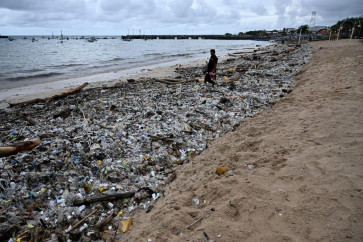Central Java toll road rest area to be shopping destination
Private toll road operator Astra Infra, the infrastructure arm of diversified business group PT Astra International, is working to improve its services by upgrading its facilities for both road and rest areas to keep its business growing
Change text size
Gift Premium Articles
to Anyone

P
rivate toll road operator Astra Infra, the infrastructure arm of diversified business group PT Astra International, is working to improve its services by upgrading its facilities for both road and rest areas to keep its business growing.
Astra Infra never intended to stop at “merely” connecting cities. To maintain and grow its toll road business, the company is developing four sections of its flagship Trans-Java toll road, which spans 1,176 kilometers from West Java to East Java.
The four sections — the Tangerang-Merak section in Banten, the Cikopo-Palimanan in West Java, the Semarang-Solo in Central Java and the Jombang-Mojokerto in East Java — span a combined length of 302 km.
Wiwiek D. Santoso, the CEO of Astra Infra’s toll road business group, expressed hope that the company’s post-development strategies would increase the volume of traffic and boost revenue by at least 25 percent this year.
“We don’t want to build just a toll road. We want to create something that will inspire customers as well as local residents that live near our road,” she said during the company’s Trans-Java media tour on Feb. 24.
“That’s why we have [customized] plans for each of our four sections in Trans-Java toll road, such as boosting local businesses at our rest areas on the Semarang-Solo section, and expanding the lanes on the Tangerang-Merak section because of its industrial character,” said Wiwiek.
Astra Infra has planned a Rp 200 billion (US$14.2 million) project to develop rest areas with pedestrian bridges on the Semarang-Solo section, the first of their kind in the country.
Astra Infra has budgeted about Rp 800 billion in capital expenditures this year.
The project is to be developed under a consortium with state-owned toll road operator Jasa Marga and provincially owned company PT Sarana Pembangunan Jawa Tengah of Central Java, and aims to add value to rest areas by turning them into tourist and shopping destinations.
The plans for Resta Pendopo 456, or “rest pavilion”, consist of five buildings in two locations with a combined area of around 3 hectares on both sides of the Semarang-Solo section. It is slated to open in 2021.
Wiwiek said the company expected its toll road business to grow 30 percent through its post-development strategies. “Another driver was the full connectivity of all sections of the Trans-Java toll road [since the end of 2018]. Hence, we are upbeat that we will see growth in traffic [volume] and revenues of 25 to 30 percent this year,” she said.
Astra Infra CFO Thomas Tan concurred that the growth target was achievable, provided that there were no “arbitrary” policies on toll rates, which the logistics industry had criticized as “too costly”.
“We are optimistic [about our target]. Still, it must be supported by regulatory certainty. The toll road industry is a long-term business, so we must stick to what has been agreed in the initial business plan,” he said.
Thomas added that Astra Infra would only contribute to the profitsof its parent company, possibly as soon as 2021, when it made significant revenues from the gradual growth of traffic volume on the Trans-Java toll road.
“Last December, the four sections of the Trans-Java toll road saw about a 20 percent increase in traffic [volume] from the previous month, [...] due to the inauguration of the Jakarta-Surabaya route,” he said.
Another plan is to develop the infrastructure of the 72.45-km Tangerang-Merak section, which is managed by Astra Infra subsidiary PT Marga Mandalasakti (PTMM).
PTMM president director Kris Ade Sudiyono said the plan included improving the toll road section’s access and capacity to achieve PTMM’s 10 percent growth target for 2019.
“We will add more lanes in some parts of the toll road section to [improve] travel time, and build two interchanges in Cikupa and East Balaraja to improve access,” said Kris.
He added that PTMM had allocated around Rp 2 trillion to capital expenditures this year, which would be used primarily to finance the infrastructure development project.
The project includes adding an extra lane at kilometer marker (KM) 12 on the route from West Balaraja to Cikande to expand it to three lanes. The lane expansion project started in 2017, and had expanded the Bitung-Cikupa-West Balaraja to four lanes by December 2018.
Meanwhile, Kris said PTMM was coordinating with local property developer Alam Sutera to acquire land for the Cikupa interchange project.
“We expect to complete the East Balaraja interchange this year, while the Cikupa interchange will be completed next year,” he said, adding that at least Rp 300 billion was invested in the interchange project.
Similarly, Astra Infra subsidiary PT Lintas Marga Sedaya (LMS), which operates the Cikopo-Palimanan (Cipali) toll road section in West Java, said the company was focusing this year on opening new access routes.
LMS vice president director Firdaus Azis said at least two access routes would be developed, one connecting the new Kertajati International Airport in Majalengka, and another connecting Patimban Deep Sea Port in Subang, which is located 40 km from the Cipali toll road.
“The access route to Kertajati airport [...] will increase traffic [volume] by 2,000 to 4,000 vehicles per day,” he said.
LMS has set a minimum 10 percent growth target this year for both revenue and traffic volume. Last year, the company recorded Rp 300 billion in average daily toll revenue.
The 116.7 km Cipali toll road section currently sees an average of 36,000 vehicles per day, which falls within the company’s targeted daily traffic volume.









